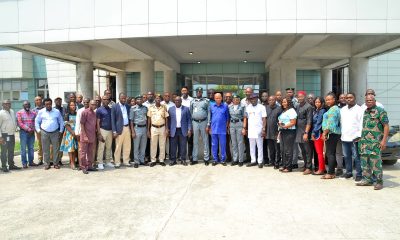Economy
Nigeria Will Flourish Very Soon—Osinbajo

By Dipo Olowookere
Vice President Yemi Osinbajo has expressed confidence that though Nigeria Economy is presently facing structural challenges, the Buhari government is confident that Nigeria will return to positive growth very soon.
He made this assurance on Tuesday September 27, 2015, at the Joint Nigeria-India Business Forum which was held sequel to the signing of Bi-lateral Agreement between the two countries, at Sheraton Hotel Abuja.
He stressed that this will be possible because the Nigerian Government has responded by adopting policies that will boost economic activities and lay a long term growth.
According to him, “Our vision is anchored on a paradigm shift in government toward transparency and accountability and making it easier to do business as we diversify the economy”.
Throwing more light he stated that, there will be replicating of the skill, scale and speed of infrastructure development, focusing especially on power, road and rail.
Noting that this business gathering is at a time that Nigeria is pursuing reforms in the oil and gas sector while undertaking major social investment to tackle poverty, inequality and promoting social inclusion; it is expected that these policies will in turn support the private sector and greater domestic and foreign investment.
He stated that, the visit of the Vice President of India and his delegation further cements the historical ties and underscores the importance of promoting business cooperation between the two countries, hoping that the two sides will use the opportunity to work out any outstanding business issues relating to bilateral and investments including access to credit lines.
In addition, he observed the need to speedily address people to people relations including cultural ties while making it easier to import and export goods and services to be exchanged between the two countries.
While commending the Indian delegation, he stated that, “Our trading engagement are of vintage quality” because, as of the 19th Century Indian traders were visiting Nigeria bringing textiles and spices and the Indian High Commission was established in Nigeria in 1958.
He further revealed that, Nigeria-India relation was given impetus for the signing of the Abuja declaration on Strategic Partnerships in October 2007 which covered a gamut of relations between the two countries, the partnership was further cemented by the visit of President Muhammadu Buhari to New Delhi in October 2015 for the third India- Africa Forum Summit.
Prof Osinbajo observed that, “These high level engagements have contributed to the strengthening our Bi-lateral Relations and providing a good basis for mutually beneficial business ties”.
He also noted that, with the change in Global Economic Landscape, India has become one of the global growth poles and is therefore gratifying that the volume of trade between the two countries have increased to about $17bn as at 2015.
The Vice President further said that the rise of India as a significant source of investment into Nigeria makes a compelling case for expanding such growth into other areas; in his words, “We should in this regard scale up the involvement of the private sectors of our two countries in enhancing growth and sustainable developments”, the appointment of Alhaji Aliko Dangote as the Co-President of the India-Africa Business Council is therefore satisfying indeed because the development will give a major boost to development, he surmised.
Concluding, the Vice President invited members of the delegation to take full advantage of the occasion, to initiate lasting business partnerships with Nigerian partners especially in the areas of information and technology, agriculture and agro-allied business, health matters including investment in health services sector, energy especially oil and gas; including renewable energies such as solar power, education including capacity building and entrepreneurship, science and technology, and services generally.
Earlier in his address, the Vice President of India, Mr Hamid Ansari expressed satisfaction with the initiatives that Nigeria has launched under the sagacious leadership of President Buhari, assuring the cooperation and partnership of India. He further expressed a strong desire of his country to expand its commercial engagement with Nigeria.
He observed that, Nigeria is an important partner for India’s energy security requirement, saying about 12% of her crude requirement comes from Nigeria; over 100 companies have made Nigeria their base to operate in West Africa employing quite a large number of Nigerians, covering diverse sectors of the economy.
The Joint Business Forum was jointly hosted by Abuja Chamber of Commerce and Industries, NACCIMA, Government of India, Confederation of Indian Industry (CII) and ASSOCHAM, India.
Economy
Why Transparency Matters in Your Choice of a Financial Broker

Choosing a Forex broker is essentially picking a partner to hold the wallet. In 2026, the market is flooded with flashy ads promising massive leverage and “zero fees,” but most of that is just noise. Real transparency is becoming a rare commodity. It isn’t just a corporate buzzword; it’s the only way a trader can be sure they aren’t playing against a stacked deck. If a broker’s operations are a black box, the trader is flying blind, which is a guaranteed way to blow an account.
The Scam of “Zero Commissions”
The first place transparency falls apart is in the pricing. Many brokers scream about “zero commissions” to get people through the door, but they aren’t running a charity. If they aren’t charging a flat fee, they are almost certainly hiding their profit in bloated spreads or “slippage.” A trader might hit buy at one price and get filled at a significantly worse one without any explanation. This acts as a silent tax on every trade. A transparent broker doesn’t hide the bill; they provide a live, auditable breakdown of costs so the trader can actually calculate their edge.
The Conflict of Market Making
It is vital to know who is on the other side of the screen. Many brokers act as “Market Makers,” which is a polite way of saying they win when the trader loses. This creates a massive conflict of interest. There is little incentive for a broker to provide fast execution if a client’s profit hurts their own bottom line. A broker with nothing to hide is open about using an ECN or STP model, simply passing orders to the big banks and taking a small, visible fee. If a broker refuses to disclose their execution model, they are likely betting against their own clients.
Regulation as a Safety Net
Transparency is worthless without an actual watchdog. A broker that values its reputation leads with its licenses from heavy-hitters like the FCA or ASIC. They don’t bury their regulatory status in the fine print or hide behind “offshore” jurisdictions with zero oversight. More importantly, they provide proof that client funds are kept in segregated accounts. This ensures that if the broker goes bust, the money doesn’t go to their creditors—it stays with the trader. Without this level of openness, capital is essentially unprotected.
The Withdrawal Litmus Test
The ultimate test of a broker’s transparency is how they handle the exit. There are countless horror stories of traders growing an account only to find that “technical errors” or vague “bonus terms” prevent them from withdrawing their money. A legitimate broker has clear, public rules for getting funds out and doesn’t hide behind a wall of unreturned emails. If a platform makes it difficult to see the exit strategy, it’s a sign that the front door should have stayed closed.
Conclusion
In 2026, honesty is the most valuable feature a broker can offer. It is the foundation that allows a trader to focus on the charts instead of worrying if their stops are being hunted. Finding a partner with clear pricing, honest execution, and real regulation is the first trade that has to be won. Flashy marketing is easy to find, but transparency is what actually keeps a trader in the game for the long haul.
Economy
Nigeria’s Stock Market Indices Shrink 0.41% Amid Panic Sell-Offs

By Dipo Olowookere
The Nigerian Exchange (NGX) Limited came under panic sell-offs on Thursday, as the investing community awaits the outcome of a probe into trading activities around one of the stocks on the bourse.
On Monday, trading in Zichis equities was prohibited by the regulator after it gained almost 900 per cent in one month of being listed by introduction on the growth board of the exchange.
This action triggered cautious trading on Customs Street, and things have not remained the same since then.
Yesterday, the key performance indices of the Nigerian bourse further depreciated by 0.41 per cent, the third straight loss this week, as investors book profit before being trapped.
It was observed that the energy industry gained 0.12 per cent and was the only one in green, as the industrial goods space shed 1.19 per cent, the banking counter depreciated by 0.63 per cent, the insurance sector lost 0.32 per cent, and the consumer goods segment tumbled by 0.03 per cent.
As a result, the All-Share Index (ASI) contracted by 802.39 points to 193,567.81 points from 194,370.20 points, and the market capitalisation decreased by N515 billion to N124.239 trillion from N124.754 trillion.
During the session, investors traded 868.5 million shares worth N31.5 billion in 69,310 deals compared with the 1.4 billion shares valued at N46.2 billion exchanged in 70,222 deals at midweek, showing a drop in the trading volume, value, and number of deals by 37.96 per cent, 31.82 per cent, and 1.30 per cent, respectively.
Jaiz Bank led the activity chart with 78.9 million equities valued at N1.2 billion, Japaul traded 73.3 million stocks worth N274.8 million, Access Holdings exchanged 66.9 million shares for N1.7 billion, Chams sold 56.9 million equities worth N239.6 million, and Zenith Bank transacted 45.5 million stocks valued at N4.1 billion.
The worst-performing stock for the day was Jaiz Bank after it lost 9.98 per cent to trade at N12.63, Ikeja Hotel declined by 9.90 per cent to N37.75, John Holt shrank by 9.90 per cent to N8.65, Enamelware slipped by 9.88 per cent to N36.50, and Cadbury went down by 9.69 per cent to N61.95.
On the flip side, FTN Cocoa was the best-performing stock after it gained 10.00 per cent to sell for N6.05, RT Briscoe improved by 9.95 per cent to N11.38, Deap Capital soared 9.92 per cent to N6.98, Japaul grew by 9.91 per cent to N3.77, and Ellah Lakes surged 9.72 per cent to N11.85.
Investor sentiment remained bearish as the exchange finished with 30 price gainers and 38 price losers, implying a negative market breadth index.
Economy
Champion Breweries Concludes Bullet Brand Portfolio Acquisition

By Aduragbemi Omiyale
The acquisition of the Bullet brand portfolio from Sun Mark has been completed by Champion Breweries Plc, a statement from the company confirms.
This marks a transformative milestone in the organisation’s strategic expansion into a diversified, pan-African beverage platform.
With this development, Champion Breweries now owns the Bullet brand assets, trademarks, formulations, and commercial rights globally through an asset carve-out structure.
The assets are held in a newly incorporated entity in the Netherlands, in which Champion Breweries holds a majority interest, while Vinar N.V., the majority shareholder of Sun Mark, retains a minority stake.
Bullet products are currently distributed in 14 African markets, positioning Champion Breweries to scale beyond Nigeria in the high-growth ready-to-drink (RTD) alcoholic and energy drink segments.
This expansion significantly broadens the brewer’s addressable market and strengthens its revenue base with an established, profitable portfolio that already enjoys strong brand recognition and consumer loyalty across multiple markets.
“The successful completion of our public equity raises, together with the formal close of the Bullet acquisition, marks a defining moment for Champion Breweries.
“The support we received from both existing shareholders and new investors reflects strong confidence in our long-term strategy to build a diversified, high-growth beverage platform with pan-African scale.
“Our focus now is on disciplined execution, integration, and delivering sustained value across markets,” the chairman of Champion Breweries, Mr Imo-Abasi Jacob, stated.
Through this transaction, Champion Breweries is expected to achieve enhanced foreign exchange earnings, expanded distribution leverage across African markets, integrated supply chain efficiencies, portfolio diversification into high‑growth consumer beverage categories, and strengthened presence in the RTD and energy drink segments.
The acquisition accelerates Champion Breweries’ transition from a regional brewing business to a multi-category consumer platform with continental reach.
Bullet Black is Nigeria’s leading ready-to-drink alcoholic beverage, while Bullet Blue has built a strong presence in the energy drink category across several African markets.
-

 Feature/OPED6 years ago
Feature/OPED6 years agoDavos was Different this year
-
Travel/Tourism10 years ago
Lagos Seals Western Lodge Hotel In Ikorodu
-

 Showbiz3 years ago
Showbiz3 years agoEstranged Lover Releases Videos of Empress Njamah Bathing
-

 Banking8 years ago
Banking8 years agoSort Codes of GTBank Branches in Nigeria
-

 Economy3 years ago
Economy3 years agoSubsidy Removal: CNG at N130 Per Litre Cheaper Than Petrol—IPMAN
-

 Banking3 years ago
Banking3 years agoSort Codes of UBA Branches in Nigeria
-

 Banking3 years ago
Banking3 years agoFirst Bank Announces Planned Downtime
-

 Sports3 years ago
Sports3 years agoHighest Paid Nigerian Footballer – How Much Do Nigerian Footballers Earn

















